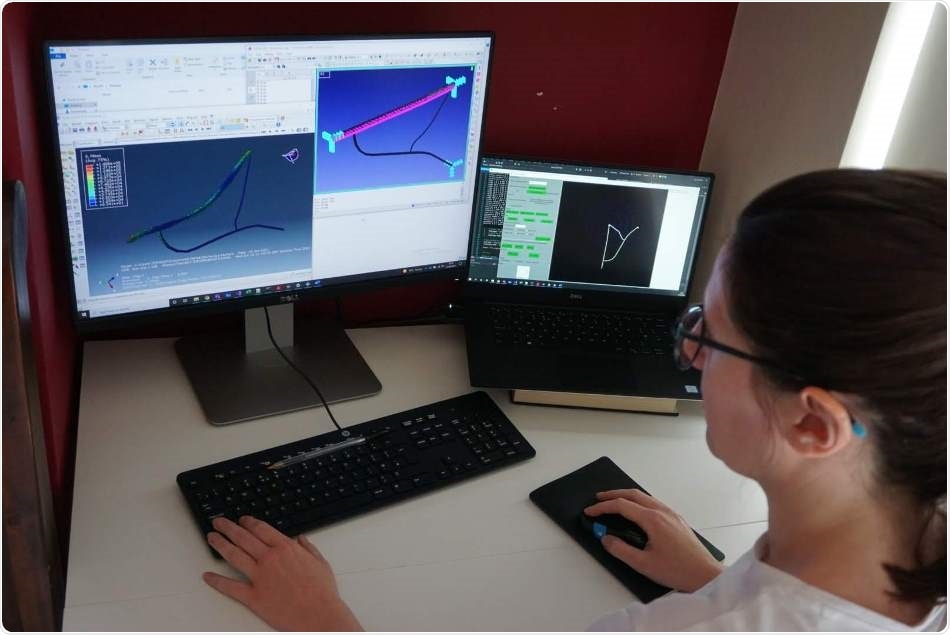The first-ever manufacturing ‘cyber seed’ which grows just like a plant and produces innovative designs for products ranging from aircraft parts to medical devices has been conceptualized by researchers – and now it is being brought to life.

Dr Imelda Friel from Queen's University Belfast works on the innovative cyber seed. Image Credit: Queen’s University Belfast
The cyber seed will allow scientists to generate new products – bespoke to end users and suited to the local environment with the materials available - at the tap of a button from anywhere in the world.
A team of experts from Queen’s University Belfast, Loughborough University and the University of York have been awarded £7.3 million by EPSRC for the ‘RIED’ (Re-Imagining Engineering Design) project.
Professor Mark Price from the School of Mechanical and Aerospace Engineering, is leading the project at Queen’s University Belfast. He comments: “This new research could really transform how design and manufacturing organizations work, making manufacturing more accessible to many sectors, efficient and distributed.”
The cyber seed is made up of ‘genes’, which are simple text descriptions of a product’s design characteristics and attributes, such as size, color and density. The genes are read by special software which then links up with a CAD (computer-aided design) system to create a 3D model of the design, ready for their manufacture and realization.
What sets this research apart from existing systems is that the cyber seed assesses the local environment and manufacturing capabilities and adapts the end product to meet the needs of the user in that area, as well as using the materials that are available at the location. This can be done virtually so a product can be created by someone in an entirely different part of the world at the tap of a button.
Professor Mark Price explains: “This cyber seed grows within a computer model just like a stem on a plant does in nature - it gets longer and longer as it grows.
“The seed generates cells which divide and copy to build up very complex shapes but they only become viable when they meet certain conditions, in the same way nature works. For example, if we have a seed for a bicycle and it is being produced by a researcher in Belfast for a customer in Belfast, the available materials may be metal and the end product would be made of aluminum. However, if the same researcher in Belfast is using the cyber seed to create a bicycle for a customer in Asia but the only available material was bamboo, the seed would pick up on this and adapt the design so that a bamboo bicycle could be produced instead.”
This new approach to ‘Design and Manufacture and Deployment’ could unlock a wealth of opportunities for the medical and bioengineering sectors. It means that it will be possible to generate patient-specific devices or therapeutic specimens that are customized, and crucially the cost and resource needed to manufacture them will not be prohibitive.
Dr Carmen Torres-Sanchez from Loughborough said: “This flexibility will allow the treatment of new diseases and the rehabilitation of patients who need, for example, a frequent change of orthopedics or an implantable device that releases medication attuned to the patients’ needs along the course of a treatment.”
Professor Price says that the new research could have very positive benefits: “As a society, we are facing many significant environmental, technical and economic challenges which require new thinking on design and manufacturing processes to allow us to adapt to problems and capitalize on opportunities.”
These concepts develop naturally, very much how a plant or living organism would grow. When we combine them with artificial evolution and intelligence we start to see some magic happens – we can produce innovative design solutions rapidly. We can also link them to manufacturing machines through the cloud and products can be made locally on demand. With advanced manufacturing methods, vending machines for complex products such as bicycles or aircraft parts are a real possibility. Such a future seems more like science fiction, but it is a very exciting time for industry and by working together we can achieve so much.”
Mark Price, Professor, School of Mechanical and Aerospace Engineering
Professor Paul Conway, the Loughborough University lead, commented: “Our approach is inherently flexible and agile, which is particularly important in designing current and next generation products, that often have multiple concurrent and interacting functions embodied and created within new challenging situations, such as the circular economy. The programme allows these challenges to become real opportunities for future innovations.”
Professor Andy Tyrell, Head of Department at the University of York’s Department of Electronic Engineering, said: "This exciting new project continues the work we have been doing in the Department of Electronic Engineering at York considering novel inspiration from natural systems and adapting these to engineering systems and components.
“This project will move our work to the next level with very strong industrial partnerships, working with Queen’s and Loughborough universities. The group at York will be focusing on the evolution of the cyber seeds that will ultimately grow to form innovative designs."
RIED will be supported by Airbus, Glen Dimplex, ITI, Rolls-Royce, Denroy, SAM UK, MTC, Far UK, OxMet, Bombardier (Spirit Aerosystems) combining the significant research background of the academic institutions with the industrial pedigree of the partner companies.